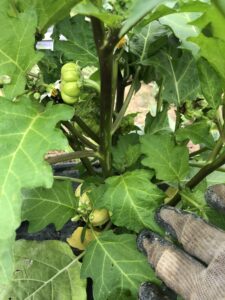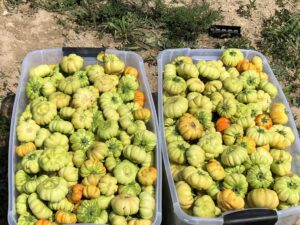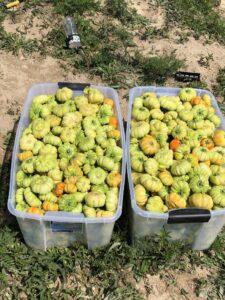Final report for FNE21-978
Project Information
This project explored the viability of growing West African eggplant in the Hudson Valley of New York State. The need for this project came out of market demand among West Africans living in New York City and Philadelphia who want a local source of this product, which is an important component of their diet. Currently they are buying West African eggplant grown in the Southeast or out of the country, which is more expensive and not as fresh or flavorful. The principal investigator, Kama Doucoure, the operator of Big Dream Farm in Saugerties, NY, sought to determine if the crop could be grown commercially and profitably.
To answer this question, Kama cultivated one acre of West African eggplant on his farm in Saugerties for one season, tracking all expenses for inputs and labor used to grow, harvest and distribute the crop throughout the season. He also tracked sales of the crop, which he priced at $5/lb. His yield for the season was 4500 lbs and he netted $3402. While this amount is a low profit per acre, he and his team learned methods, specifically around pest management that would improve yields and reduce labor for future years. Demand for the product is strong among the communities he sold to and he may also be able to increase pricing. Overall, Kama was pleased with the results and plans to incorporate this crop into his crop plans in future seasons.
The project seeks to determine the financial feasibility of producing one acre of African eggplant in New York’s Hudson Valley Region. The specific objectives for this project include:
- Cultivate one acre of African eggplant in Saugerties, NY
- Compile a list of enterprise-specific costs for the production of one acre of African eggplant, including supplies, specialized equipment, and labor.
- Compile a list of enterprise-specific income for the sale of one acre of African eggplant, including sales through retail and wholesale marketplaces.
- Create an African eggplant enterprise budget that shows per unit gross margins and net profit/loss for the enterprise.
- Produce three, 2-3 minute videos of different production practices for African eggplant.
Through this project we hope to better understand the financial feasibility of commercial production of one acre of African eggplant in New York’s Hudson Valley. Clear data on enterprise-specific costs and income for 1 acre of African eggplant will offer regional farmers the opportunity to test feasibility of adding this enterprise to their own farms.
Between 2010-2018, the population of sub-Saharan African immigrants in the United States increased by 52 percent. Overall, approximately 2 million African immigrants now reside in the United States, up from less than 150,000 in 1980. New York State is home to the second largest proportion of African immigrants in the country, with Bronx County in New York City being the county with the second highest concentration of African immigrants in the United States.[1]
Despite a growing population, West African immigrants lack access to fresh, culturally appropriate food products, including fresh vegetables. Immigrant farmers, who have traditional knowledge of these crops and connections to markets, face significant barriers to starting farm businesses, including systemic racism, language barriers, and cultural appropriate learning opportunities. In addition, very little research has been performed on the financial feasibility of African vegetable crops to test their profitability. Because of this, and despite a growing market, there is a significant lack of cultivation of fresh African food products in the Northeast.
African eggplant (solanum aethiopicum), also known as bitter tomato, Ethiopian eggplant, or nakati, is a West African vegetable, with a somewhat bitter taste, that is a popular fresh ingredient for traditional African cuisine. The product is only occasionally available in the United States through import markets.
This project proposes to grow 1-acre of African eggplant in New York’s Hudson Valley region and study the associated profitability. By researching the financial feasibility of African eggplant production through the creating of an enterprise budget, regional farmers will have an improved understanding of costs and expected income for African eggplant. Using this, farmers can assess the financial feasibility of adoption of this enterprise to their own businesses, which has the potential to increase net farm income and improve productivity. Adding more culturally appropriate food products to the regional agricultural landscape adds to diversity, engages marginalized populations in local food systems, improves health and nutrition for systematically marginalized populations, and helps to develop supply chains owned by people of color.
[1] [1] https://www.migrationpolicy.org/article/sub-saharan-african-immigrants-united-states-2018
Kama started Big Dream Farm 2019. While he is the principal operator of the farm, it is a community owned farm with 55 people in ownership. Kama oversees the farming operation part time and there is a rotation of all the member owners working on the farm. Each member works one full day a month (some work more frequently than that) with a total of 80 person hours per week. They cultivate three acres in Saugerties, NY, growing the following crops: West African eggplant, okra, tomatoes, lettuce, cucumbers, hot peppers, mint, and sweet potatoes. They also raise sheep for meat. Their gross sales in 2022 was $105,000.
Big Dream Farm has a unique, community-based marketing system. They distribute to a few networks of West African Families in New York City and Philadelphia. They announce their product availability and pricing through groups set up on WhatsApp, and people order through the app. They then deliver the products to people's homes with the support of various community members. Kama is hoping to also become a vendor at GrowNYC's Greenmarkets and to their Wholesale division and is currently working with staff there to onboard to those channels.
No existing farm resources were dedicated to this project.
Cooperators
- - Technical Advisor
Research
Objective 1: Cultivate and market 1 acre of African eggplant in Saugerties, NY
Methods and Measurements: Kama successfully sprouted, transplanted, and protected his African Eggplant crop from pests in the 2021 season. Due to the high rainfall during Hurricane Ida in September of 2021, the field were wiped out and he lost his crop for the season. In 2022, Kama successfully cultivated 1 acre of African eggplant, yielding a total of 4500 pounds for the season. African eggplant seeds were purchased, and seeds were started in a heated greenhouse in mid-late February 2022. In May, primary tillage, composting, drip tape laying, and black plastic mulch installation occurred to prep fields for transplanting. After transplanting, interrow weeding and pest and disease scouting occurred, ensuring healthy production. Harvesting began in mid-June and continued through late September. Kama sold the crop directly to customers in his community who are primarily West African immigrants currently living in the Bronx, Brooklyn, Queens, and Philadelphia.
Objective 2: Compiling a list of enterprise-specific costs for the production of one acre of African eggplant, including supplies, specialized equipment, and labor.
Methods and Measurements: All enterprise-specific receipts for production of African eggplant were maintained in both physical form (where possible) and digital form. Receipts were also maintained for those costs that were incurred before the project start date of March 1st, 2021, including seeds and lime. Labor records were maintained through the completion of labor logs completed each day and filed each week.
Objective 3: Compiling a list of enterprise-specific yields and income received for the sale of one acre of African eggplant, including sales through retail and wholesale marketplaces.
Methods and Measurements: Starting with the first harvest of African eggplant at the end of June 2021, the farm team measured all yields of African eggplant through daily yield logs. All enterprise-specific sales of African eggplant were maintained throughout the project life in physical (where possible) and digital form. Beginning with the first sales of African eggplant in June 2022, weekly sales logs were maintained noting the primary market channel (wholesale, retail, etc), the types of unit sold (per pound, 15 lb/box, etc), the number of each unit sold, and the price received.
Objective 4: Creating an African eggplant enterprise budget that shows per unit gross margins and net profit/loss for the enterprise.
Methods and Measurements: Upon the completion of all sales of African eggplant in September 2022, we organized all expenses and income for the African eggplant enterprise for placement into an enterprise budget template. We built all associated expenses and income into an intuitive and accessible document that shows economic feasibility of African eggplan, including only those costs that are directly associated with the enterprise under research. Where an enterprise expense is part of a broader farm expense, such as gas used to fuel market vehicle that may be carrying other farm products, a percentage of total cost method were used to determine costs. The enterprise budget document clearly shows total enterprise expenses, gross revenue by market type, total gross revenue, net profit, and per/unit gross margin.
Objective 5: Produce three, 2-3 minute videos of different production practices for African eggplant.
Methods and Measurements: Understanding that immigrant farmers often do not obtain information about agricultural production techniques from traditional ag resources such as written guides, we produced three short videos showing African eggplant production techniques. These videos were produced using cellphone cameras, and show greenhouse starts, planting, and harvesting techniques.
Costs, Yields, Revenue, and Profit
Kama began his project in the spring of 2021 but unfortunately lost his crop due to high rainfall caused by Hurricane Ida in September of 2021. in 2022, he was able to successfully cultivate an acre of African eggplant using organic production methods. His total yield for the season was 4500. He was able to sell the product for $5/pound to customers in New York City and Philadelphia, which was cheaper than what they were paying for the same product imported from the Southern United States or outside the country. He generated slightly more than $3000 in profit per acre from the project. The breakdown of revenue, input costs and labor costs can be seen on the enterprise budget attached to this report.
Production
Cultivating the crop using organic methods was very labor intensive. Between April and June, Kama and his staff spent 432 person-hours managing insect pressures on the farm, removing them by hand. The primary insect pest they dealt with was the Colorado Potato Beetle. Hand removal was time consuming, but this method taught him to understand the insect's life cycle and ultimately the ideal time was to remove the pest. He learned that the when the insect's eggs turned brown, they were bigger to remove because the color and size at that stage made them easier to see. The ones that were hiding under the plant's leaves were harder to see until they hatched because then they were a bright yellow. He also learned of a natural insect repellant used in Africa, made from soaking hot peppers in water for 24 hours, that can be sprayed on the plant. He intends to try this method during the next production season.
Weeding was also labor intensive. Kama and the farm crew spent nearly 500 hours hand weeding. Because he used black plastic on the beds, weeding was primarily an issue between rows. In future years he intends to use wood chips and mulch to manage inter-row weed pressures.
Drought was a minor issue for Kama as it was an issue in New York's mid-Hudson Valley in the summer of 2022. However drought is a much bigger issue in West Africa. Drought could be a more significant issue in the future due to the impacts that climate change is having on water supply and rainfall.
Photos
Below are photos showing the plants in various stages of maturity and the harvested fruits.
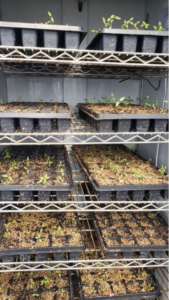
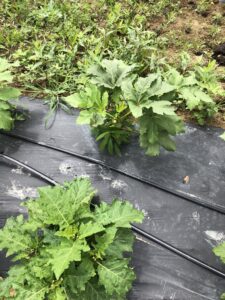
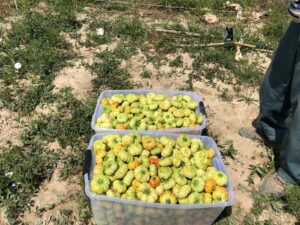
At the beginning of this project, Kama sought to provide a local, chemical-free source of West African eggplant to sell to his community of West African immigrants living in New York City and Philadelphia. He wanted to embark on this project because this crop is an important part of his community's diet, and they were currently relying on imported crops, from Africa, the Dominican Republic, and Honduras. The community felt that the taste was inadequate because it was not as fresh and it was also very expensive. This goal relates to Kama's larger goal of helping to connect West Africans together to support each other and the community.
From a business perspective, Kama wanted to have a product that differentiated him in the marketplace and gave him brand recognition as growing West African crops for the West African community and market in New York City and Philadelphia.
From a production perspective, Kama feels that West African eggplant is easier to cultivate in the Hudson Valley than in Mali because there is less drought pressure and inputs to manage weed pressure, such as woodchips and plastic mulch, are easier to access.
At the end of this project, Kama believes he has met this objective. He was able to successfully grown 4500 pounds of the crop and generate a profit of more than $3,000 per acre in his first year of growing. He also believes that he has more information and is better equipped to cultivate this crop in the Hudson Valley climate and land conditions. Finally, his community was very pleased with product, with both the flavor and freshness, and was also happy to be able to purchase it at a lower price than what the imported version costs.
Kama is looking forward to cultivating other crops to meet the needs of the West African community so that they are able to eat fresh, locally grown, chemical free products at a lower price.
Education & Outreach Activities and Participation Summary
Participation Summary:
Learning Outcomes
Kama and his team gained knowledge about how to successfully cultivate this crop in the mid-Hudson Valley of New York. Specifically they gained the following knowledge
- Colorado potato beetles are the primary insect pressure and can kill the plants, so it is important to be vigilant in managing this issue.
- The team now understands the life cycle of the Colorado potato beetle and the ideal time to manage it using hand methods.
- They also learned about new, natural techniques for managing this insect, specifically the hot pepper infusion described above, that can serve as a repellant for the insect.
- They learned that because of a more abundant water supply West African eggplant is easier to cultivate in the mid-Hudson Valley than it is in West Africa.
From a demand perspective, Kama learned that there is a robust market for a local, fresh source of West African eggplant and that it is cheaper to produce it here than to import it. Further and expanded cultivation could reduce the need for Kama and other West African immigrants to have to import this product and can save them money.
Project Outcomes
The outcomes of this product is that Kama now has an additional crop he can grow and sell for profit to the West African community in New York City and Philadelphia. The community he provides food for are able to enjoy more of this product if they buy it from Kama because it is cheaper than buying the imported version. Kama is also excited to trial other culturally significant crops his community wants to eat so that he can provide fresh, local sources of them.
This was a fairly simple project to carry out - determine if a crop that has not historically been cultivated in this region is viable to cultivate here. Key to the project's success was having a primary investigator who is skilled at farming and a market interested in purchasing the product. The question that Kama set out to answer - Is it possible to cultivate West African Eggplant in New York's mid-Hudson Valley, using natural production methods? - was answered affirmatively. Kama and his team plan to cultivate this crop at a larger scale in future years and will hopefully develop more efficient methods of managing pest and weed pressures, ideally to bring down the cost of production so that they can capture more profit. He feels that other farmers looking to grow culturally significant crops not readily available in the New York metropolitan region but that are botanically similar to other crops grown in this region will benefit from this project's approach and methods.
